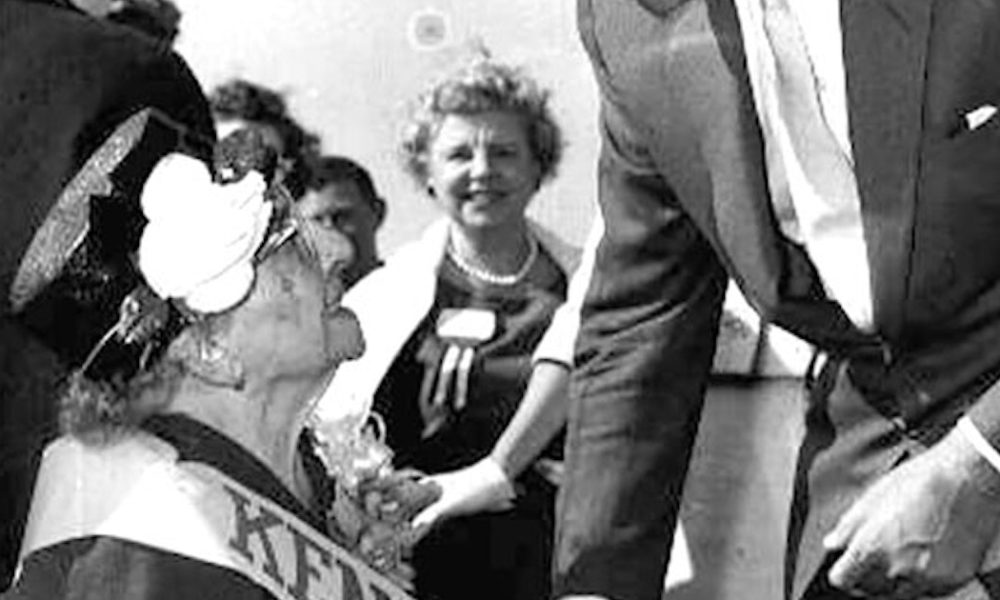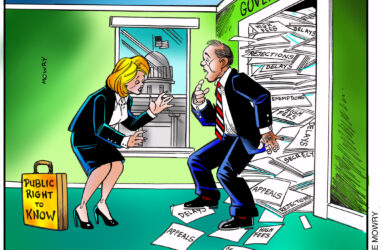 Sen. John F. Kennedy greets Mrs. Mary M. Barr at the Salem airport on Sept. 7, 1960. IMAGE: MARION COUNTY HISTORICAL SOCIETY
Sen. John F. Kennedy greets Mrs. Mary M. Barr at the Salem airport on Sept. 7, 1960. IMAGE: MARION COUNTY HISTORICAL SOCIETY
As the 1960 Democratic presidential primary neared, Sen. John F. Kennedy was looking at Oregon with increasing apprehension.
At that time, Oregon was the first Western state to hold a mandatory primary – in which every candidate appeared on the ballot whether he wanted to be or not. That position, combined with the state’s well-deserved reputation as an electoral maverick, made it a rather daunting prospect.
Oregon had, over the previous decade or two, smashed other well-positioned would-be presidents’ hopes. In 1948, popular Minnesota governor Harold Stassen looked like he had a great shot at the Republican nomination until the polls closed in Oregon and he found that Thomas Dewey of New York had thumped him. His campaign never recovered.
Kennedy was very much hoping to avoid having the same thing happen to him. And, frankly, his chances weren’t looking particularly good.
First off, Oregon was quite possibly the least Catholic-friendly state in the West at the time. The Ku Klux Klan’s rise in Oregon in the 1920s had been largely driven by anti-Catholic prejudice, and before the Klan’s support had collapsed under the weight of its own hypocrisy and corruption, it had put forward a ballot measure that actually outlawed Catholic schools. The measure passed easily, and had it not been ruled unconstitutional by the Supreme Court, it would have forced the closure of all Catholic grade schools statewide.
It’s easy to forget this today, but in 1960 there were still plenty of Protestants who called Catholics ”Papists” and worried about their loyalty. A Catholic president, these voters thought, would take marching orders from the Vatican. It would be like electing an agent of a foreign government to the most important job in the land.
So, there was that. But probably more on Kennedy’s mind was the personal animosity his brother Robert Kennedy had stirred up in the Beaver State; the enthusiasm with which he had prosecuted the then-mobbed-up Teamsters Union, in the process actually indicting and prosecuting Portland’s popular Democratic mayor, Terry Schrunk. The Teamsters were still powerful in Oregon and elsewhere, and Schrunk – although acquitted of all charges – had become a lifelong personal enemy of the entire Kennedy family.
So, too, apparently, had Oregon’s most prominent national politician, Sen. Wayne Morse. Morse considered Kennedy too young and callow for the job. (In fairness, history would give some pretty strong evidence that he was right about this, at least at first.) He felt that, given the unprecedented power vested in the American President in the nuclear age, extreme measures were called for to prevent his nomination. So he had launched a last-minute bid for the nomination, in competition with Kennedy – and, of course, he’d enjoy favorite-son status.
So yes, Oregon was going to be a real challenge for Kennedy. But could a loss in Oregon actually derail Kennedy’s entire campaign?
Kennedy sure thought so, and in a retrospective essay written four years later, legendary Oregon politician and newspaper publisher Monroe Sweetland makes a strong case that he was right. The problem was, although he had had some good momentum going into the primary, he didn’t have enough to be able to afford a loss. He’d hoped the Wisconsin primary, held a few weeks earlier, would inoculate his campaign bandwagon against anti-Catholicism; but the opposite happened: he won there, but by a narrow margin, and the key Protestant-heavy districts strongly went for his opponents.
A defeat in Oregon would be the second punch in a one-two knockout play, reinforcing the message to the nation’s political bosses that being Catholic was a deal-killer for the voters. Those bosses were watching the action carefully; if it went badly, Kennedy’s campaign would probably not survive, and even if it did, Republican Richard Nixon would find in the anti-Catholic issue a hot campaign topic that played straight to his best political strengths. No Oregon, no White House, Sweetland writes. And he is probably right.
On the other hand, a decisive victory in Oregon would provide the inoculation against the Catholicism issue that Kennedy had hoped to get from Wisconsin, plus demonstrating that JFK could win friends and influence people out west, as well as back east. A decisive win in Oregon would make Kennedy’s nomination all but inevitable. So, Sweetland writes, Oregon was almost literally Kennedy’s make-or-break moment.
Kennedy’s prospects in Oregon started out bad and quickly got worse. As the big day approached, however, some things started breaking Kennedy’s way. Some of them were very big things. Probably the most important of these was, it soon became clear that Morse had overplayed his hand. He’d waited until the last minute to launch his bid for the presidency, and it was pretty obvious to all involved that he wasn’t serious about being elected president – he was running primarily to deny Kennedy the nomination. Other Oregon Democrats might have supported his position that Kennedy wasn’t ready, but they sure weren’t going to risk taking the blame for their party losing a presidential election. So nearly all Oregon Democratic leaders, including many of Morse’s personal friends, stuck with Kennedy even after Morse announced his bid. Time Magazine reported that Morse was furious about this – but Morse was enough of a political realist that he probably didn’t expect committed Kennedy people to drop everything and rally to his last-minute flag.
Kennedy couldn’t bank too much on that, of course, because Morse was still the most popular politician in Oregon. So, he kept a suitably humble spirit about himself as he campaigned in Oregon, and tried to do a little pre-election damage control: ”I’m hoping to be a good second to Sen. Morse,” he said.
But, as he well knew, second place wouldn’t work. Actually winning the election might not even work if he didn’t nail down an actual majority of votes (there were six candidates on the ballot); already there were rumors of a last-minute coalition forming around Adlai Stevenson.
In the end, Kennedy got exactly what he needed from Oregon, and hardly a single vote more. The final vote tally put him at 50.9 percent of the vote – a commanding lead over the number-two vote-getter, Morse, with 32 percent.
Nationwide, the results were immediate. Kennedy’s nomination was never really in doubt after that, although a last-minute push was made to get all the other candidates’ supporters to unite behind Adlai Stevenson.
”The Oregon Trail for Sen. John F. Kennedy was really the end of a long, grueling cross-country tour de force,” Time Magazine wrote. ”Pitted for the first time against a field of four, Kennedy registered a knockout.”
So, was it true? Did Oregon effectively play kingmaker for the country in 1960?
Sweetland, writing from the political trenches, thinks it absolutely did. And although in his 2000 article Jack Ohman – the Portland Morning Oregonian’s editorial cartoonist, who was at the time a graduate student at Portland State University – expresses appropriate academic reluctance to make wild speculations, he qualifiedly agrees that it probably did.
(Sources: Ohman, Jack. ”Did the Oregon Primary Make Kennedy President?”, Oregon Historical Quarterly, Fall 2000; Sweetland, Monroe. ”The Friday in Oregon that Made Kennedy President,” Oregon Historical Quarterly, Fall 2000)
Finn J.D. John teaches at Oregon State University and writes about odd tidbits of Oregon history. For details, see http://finnjohn.com. To contact him or suggest a topic: [email protected] or 541-357-2222.







